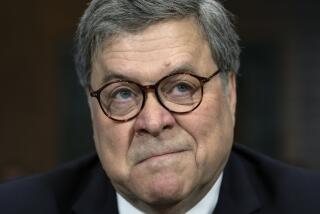Morality Is Ignored in Torture Memo
- Share via
John C. Yoo’s July 6 commentary, “A Crucial Look at Torture Law,” only serves to deepen the betrayal that the Justice Department’s office of legal counsel engaged in when it wrote the Aug. 1, 2002, memo to define torture.
Rather than accepting responsibility, Yoo defends the memo with an excuse that consists of “I was just doing my job” -- chilling when the subject is torture. He claims that issues of policy, human rights, international opinion and morality have no place in a legal memo whose purpose is strictly to define the law. Yet his own commentary shows just how these issues in the “war on terrorism” informed the analysis in the memo. Rather than define torture according to U.S. and international standards, the office of legal counsel succeeded in outlining what the government could conceivably get away with to stop terror.
As a law student who has represented victims of torture, I am disturbed by both his representation of the duty of lawyers and his failure to acknowledge why we have outlawed torture. No law or treaty was designed for governments or other perpetrators of torture, but to prevent the creation of more victims.
Jen Flory
Los Angeles
One winces to see Yoo try to escape responsibility for his moral values by resorting to the old flim-flam of “we just told them what the law is, not whether it is right or wrong” in justifying the memo on torture. The law never just “is”; it is always being pulled this way and that by interpreters who see it through the lenses of their own values. If people with other values had been in charge at the Justice Department, the memo would have reached different conclusions. The intellectually honest thing for Yoo to have written would have been something like this: “We are conservatives who are not morally bothered by torture in present circumstances. We wanted to marshal the legal arguments in favor of torture. That’s what the Justice Department memo does.”
Robert Benson
Professor of Law
Loyola Law School, L.A.
Yoo’s commentary presents many well-thought-out ideas while addressing the August 2002 memo about the meaning of “torture.” He went on to embellish the memo as to its import.
Most telling, he says, “An American leader would be derelict of duty if he did not understand all his options in such unprecedented circumstances.” Further on in the same paragraph he states, “Our leaders should ask legal questions first, before setting policy or making decisions in a fog of uncertainly.” It’s unfortunate that those leaders in the White House did not have the ability and understanding of what Yoo pointed out.
J.B. Gillerman
Los Angeles
More to Read
Sign up for Essential California
The most important California stories and recommendations in your inbox every morning.
You may occasionally receive promotional content from the Los Angeles Times.













